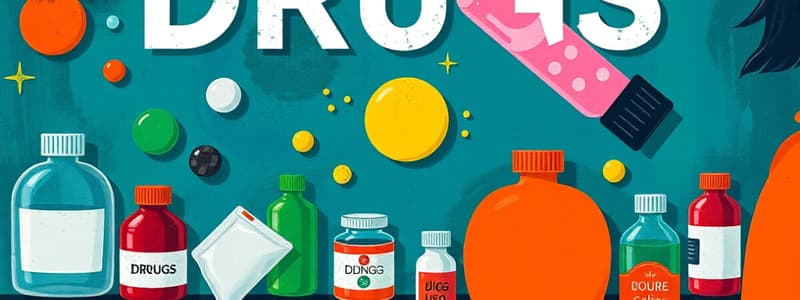Podcast
Questions and Answers
What are drugs primarily defined as?
What are drugs primarily defined as?
- Only illegal substances that can be harmful
- Naturally occurring substances only
- Chemicals that affect both mind and body (correct)
- Medications prescribed by doctors
Which of the following is NOT a common risk factor for teens trying drugs?
Which of the following is NOT a common risk factor for teens trying drugs?
- Strong academic performance (correct)
- Favorable attitude towards drugs
- Parental drug use
- Friends who use drugs
What effect do stimulants generally have on the brain and central nervous system?
What effect do stimulants generally have on the brain and central nervous system?
- They cause visual hallucinations
- They speed up brain activity (correct)
- They induce relaxation and calmness
- They inhibit brain activity
How does alcohol affect the body upon consumption?
How does alcohol affect the body upon consumption?
Which of the following is an example of a depressant?
Which of the following is an example of a depressant?
Which of the following statements about hallucinogens is true?
Which of the following statements about hallucinogens is true?
What is a common characteristic of family management problems that may lead to drug use?
What is a common characteristic of family management problems that may lead to drug use?
What is a potential consequence of overdosing on drugs?
What is a potential consequence of overdosing on drugs?
What are some of the consequences of driving while intoxicated?
What are some of the consequences of driving while intoxicated?
Which substance is known to be addictive like nicotine, alcohol, and cocaine?
Which substance is known to be addictive like nicotine, alcohol, and cocaine?
What chemical is primarily responsible for the addiction to tobacco products?
What chemical is primarily responsible for the addiction to tobacco products?
What is the main active chemical in marijuana?
What is the main active chemical in marijuana?
Which of the following is a short-term effect of marijuana use?
Which of the following is a short-term effect of marijuana use?
Why do many teens find it difficult to quit using tobacco?
Why do many teens find it difficult to quit using tobacco?
Which of the following describes a consequence of long-term marijuana use?
Which of the following describes a consequence of long-term marijuana use?
What effect does alcohol have at low doses?
What effect does alcohol have at low doses?
Which of the following is a possible effect of long-term excessive drinking?
Which of the following is a possible effect of long-term excessive drinking?
What condition is characterized by swelling and liver damage in heavy drinkers?
What condition is characterized by swelling and liver damage in heavy drinkers?
What is a severe outcome of high doses of alcohol consumption?
What is a severe outcome of high doses of alcohol consumption?
Which symptom is associated with alcoholic cirrhosis?
Which symptom is associated with alcoholic cirrhosis?
How does chronic heavy alcohol use affect the heart?
How does chronic heavy alcohol use affect the heart?
Which of the following is NOT a symptom of alcoholic hepatitis?
Which of the following is NOT a symptom of alcoholic hepatitis?
What happens to the kidneys with excessive alcohol intake?
What happens to the kidneys with excessive alcohol intake?
What is a common short-term effect of meth use?
What is a common short-term effect of meth use?
Which of the following is a long-term effect of heroin abuse?
Which of the following is a long-term effect of heroin abuse?
How does heroin affect the brain?
How does heroin affect the brain?
Which of the following is NOT a symptom of long-term meth use?
Which of the following is NOT a symptom of long-term meth use?
What serious risk is associated with short-term heroin use?
What serious risk is associated with short-term heroin use?
What is a common effect of meth that can result in severe health issues?
What is a common effect of meth that can result in severe health issues?
Which of the following describes a physical consequence of long-term meth use?
Which of the following describes a physical consequence of long-term meth use?
What is a potential long-term effect of using heroin through needle use?
What is a potential long-term effect of using heroin through needle use?
What is a common physical effect experienced by LSD users?
What is a common physical effect experienced by LSD users?
Which of the following is a potential psychological effect of LSD?
Which of the following is a potential psychological effect of LSD?
What misconception do many teens have about prescription drugs?
What misconception do many teens have about prescription drugs?
What is a severe effect that can occur with prolonged LSD use?
What is a severe effect that can occur with prolonged LSD use?
Which symptom is associated with severe anxiety and paranoia during drug use?
Which symptom is associated with severe anxiety and paranoia during drug use?
What can be a life-threatening consequence of prolonged drug use?
What can be a life-threatening consequence of prolonged drug use?
Which experience is often referred to as a 'trip' in the context of LSD use?
Which experience is often referred to as a 'trip' in the context of LSD use?
What misconception might lead teens to misuse prescription drugs?
What misconception might lead teens to misuse prescription drugs?
Flashcards are hidden until you start studying
Study Notes
What Are Drugs?
- Drugs are substances that affect the mind and body.
- Prolonged drug use leads to physical or psychological dependence.
- Drug overdose can be fatal.
Why Do Teens Try Drugs?
- Friends who use drugs
- Lack of healthy recreational interests
- Early antisocial behavior
- Parental drug use
- Academic failure
- Favorable attitude towards drugs
- Prenatal exposure to alcohol
- Poorly defined family rules
- Lack of parental monitoring
- Excessive discipline
- Negative communication patterns
- Poor anger management
Types of Drugs
- Stimulants speed up the central nervous system.
- Depressants slow down the central nervous system.
- Hallucinogens alter consciousness, distorting auditory and visual sensations.
Stimulants
- Caffeine found in coffee, energy drinks and tea.
- Nicotine found in cigarettes.
- Amphetamines, including methamphetamine, ecstasy and speed.
- Bath salts
- Cocaine and crack cocaine
- Diet pills
Depressants
- Alcohol (beer, wine, vodka, tequila, gin, etc.)
- Heroin
- Tranquilizers
- Sleeping pills
- Marijuana
Hallucinogens
- LSD
- Ecstasy
- Magic Mushrooms
- Peyote
- PCP
Alcohol
- Central nervous system depressant - affects brain and body within minutes.
- Low doses cause relaxation, reduced tension, lower inhibitions, impaired concentration, slower reflexes and impaired reaction time.
- Medium doses cause slurred speech, drowsiness, altered emotions, and impaired coordination.
- High doses cause vomiting, breathing difficulties, unconsciousness, coma, and death.
Alcohol's Effects on the Body: Central Nervous System
- Altered speech
- Hazy thinking
- Slowed reaction time
- Dulled hearing
- Impaired vision
- Weakened muscles
- Foggy memory
Alcohol's Effects on the Body: Liver
- Fatty Liver Disease: buildup of fat in liver cells which can be reversed by abstaining from alcohol.
- Alcoholic Hepatitis: swelling and damage to the liver, can be mild or severe, severe cases cause liver failure and death.
- Alcoholic Cirrhosis: scarring of the liver, irreversible, may cause liver failure.
Alcohol's Effects on the Body: Kidneys
- Impaired ability to regulate fluid and electrolyte levels.
Alcohol's Effects on the Body: Heart
- Increased risk of heart disease.
- Worsen high blood pressure and diabetes, both risk factors for heart disease.
Alcohol: Drinking and Driving
- 32% of fatal car crashes involve an intoxicated driver or pedestrian.
- Driving While Intoxicated (DWI) is a crime with serious consequences: substantial fines, license revocation, higher insurance premiums, possible incarceration, and ineligibility for federal student aid.
Nicotine and Tobacco
- Highly addictive substance similar to alcohol, cocaine and morphine.
- Found in tobacco plants, smoked, chewed, or sniffed.
- Contains nicotine, a highly addictive substance.
- Contains tar, a group of 19 cancer-causing chemicals.
- Contains over 4,000 other chemicals.
Nicotine and Tobacco: Medical Consequences
- Addiction and dependence.
- Cancer.
- Heart disease.
- Stroke.
- Respiratory illnesses.
- Gum disease.
Nicotine and Tobacco: Quitting
- Nicotine is highly addictive.
- Young brains are still developing, making teens more vulnerable to addiction.
Marijuana
- Also known as: blunt, dope, ganja, grass, joint, bud, Mary Jane, pot, reefer, green, skunk, weed, hash, tea, chronic, loud.
- Dried flowers, stems, seeds and leaves from the Cannabis sativa plant.
- Contains THC (tetrahydrocannabinol), which affects the brain and other organs.
Short-Term Effects of Marijuana
- Poor memory and learning ability
- Difficulty thinking and problem-solving
Long-Term Effects of Marijuana
- Breathing problems
- Weakened immune system
Methamphetamine
- Also known as: Ice, crank, chalk, crystal, fire, glass, go fast, speed, Tina, T
- Highly addictive and damaging to the body and brain.
Short-Term Effects of Methamphetamine
- Rapid/irregular heartbeat
- Increased blood pressure
- Elevated body temperature
- Reduced motor skills
- Impaired verbal skills
- Hallucinations
- Convulsions and seizures
- Panic and psychosis
- Death from stroke, heart attack or organ failure
Long-Term Effects of Methamphetamine
- Extreme weight loss
- Dental problems
- Sores and scabs on skin and face
- Anxiety and violence
- Paranoia, hallucinations and delusions
- Sensation of insects crawling under skin
- Extreme tooth decay
- Depression
- Damage to the brain similar to Alzheimer's disease
- Stroke and epilepsy
Heroin
- Also known as: Smack, horse, brown sugar, dope, H, junk, skag, skunk, white horse, China white, Mexican black tar
- Highly addictive opiate drug.
- Overdose is a real and deadly risk.
- Produced from morphine, a naturally occurring substance derived from poppy plants.
- Abused by injecting, snorting or smoking.
Short-Term Effects of Heroin
- Suppressed breathing
- Nausea and vomiting
- Blood clots that can travel to the lungs, liver, heart or brain, causing instant death.
Long-Term Effects of Heroin
- Infection of the heart lining and valves.
- Liver disease.
- Lung disease.
- Hepatitis and HIV/AIDS from needle use.
- Addiction and physical dependence.
- Sleep problems
- Severe anxiety and paranoia
- Faintness and chills or swelling
- Blurred vision
- Involuntary teeth clenching
- Nausea
- Convulsions
- Death
LSD
- Also known as: acid
- Powerful mood-altering chemical.
- Manufactured from lysergic acid, found in ergot fungus growing on rye and other grains.
- Sold on the street as tablets, capsules, or gelatin squares.
- Causes serious disconnection from reality.
Physical Effects of LSD:
- Dilated pupils
- Higher or lower body temperature
- Sweating or chills
- Loss of appetite
- Sleeplessness
- Dry mouth
- Tremors
Mental Effects of LSD:
- Delusions
- Visual hallucinations
- Artificial sense of euphoria or certainty
- Distortion of one’s sense of time and identity
- Impaired depth perception
- Impaired time perception
- Severe, terrifying thoughts and feelings
- Fear of losing control
- Panic attacks
- Flashbacks, recurrence of the LSD trip, often without warning and long after taking LSD.
- Severe depression or psychosis.
Prescription Drugs
- Recreational use of prescription drugs is a serious problem among teens and young adults.
- Teens often think prescription drugs are safe because they are prescribed by a doctor, but taking them for nonmedical use can be dangerous and addictive.
Studying That Suits You
Use AI to generate personalized quizzes and flashcards to suit your learning preferences.



